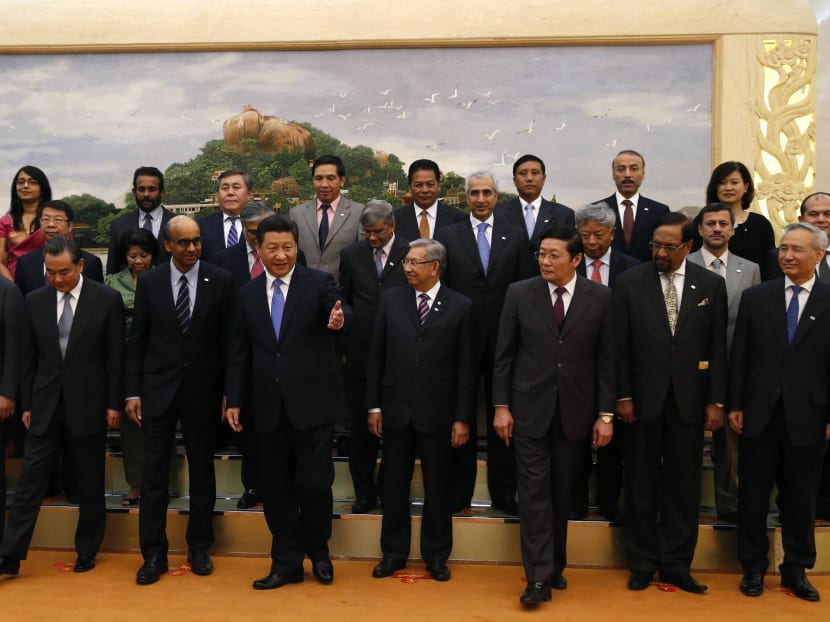China, 20 nations ink deal for Asian development bank
BEIJING — China and 20 other Asian nations yesterday agreed to a new Beijing-backed international bank for Asia that Washington opposes as an unnecessary rival to established institutions such as the World Bank.

China's President Xi Jinping (front centre) guides guests at the Asian Infrastructure Investment Bank launch ceremony at the Great Hall of the People in Beijing Oct 24, 2014. Photo: Reuters
BEIJING — China and 20 other Asian nations yesterday agreed to a new Beijing-backed international bank for Asia that Washington opposes as an unnecessary rival to established institutions such as the World Bank.
Representatives of the 21 nations signed a Memorandum of Understanding at the Great Hall of the People in the heart of Beijing to establish the Asian Infrastructure Investment Bank (AIIB).
The new bank reflects both China’s desire to push investment in the region and its frustration with United States, Japanese and European dominance of the World Bank, International Monetary Fund and Asian Development Bank (ADB).
The new lender would fund the construction of roads, railways, power plants and telecommunications networks in Asia that global finance officials say are needed to keep the region’s economies humming along.
Those taking part include regional economic powers such as India, along with smaller but economically vibrant nations such as Singapore, Vietnam, the Philippines and Mongolia. Absent are US allies Japan, South Korea and Australia, whose membership was sought by China.
Chinese President Xi Jinping proposed the bank a year ago at a gathering of Asia-Pacific nations. China has said it will provide most, if not all, of the initial US$50 billion (S$63.8 billion) in capital.
Overseeing the signing ceremony, Chinese Finance Minister Lou Jiwei said the move marked a new stage in preparations for the bank’s formal establishment, the date for which has not been given.
“We hope that through our joint efforts, we can build the AIIB into a professional and efficient financing platform for infrastructure,” he said.
Mr Lou described the future bank as a “multinational financial institution which is fair, just, open ... with a good governance structure”.
In a nod to concerns the bank could undercut existing institutions, Mr Lou said it would complement the existing multinational financial institutions and is committed to regional infrastructure and sustainable development.
China is also backing another US$50 billion lending institution, the New Development Bank, sponsored by the so-called BRICS countries that also include Russia, India, Brazil and South Africa.
The planned capital of the Chinese-backed development banks is relatively small compared with existing institutions. The World Bank’s capital is about US$220 billion and the ADB has US$175 billion capital.
US objections dwell mainly on worries the new infrastructure bank could lower international lending standards and work against existing multinational lenders by offering laxer environmental, labour and other safeguards for loans that are intended to prevent abuses and protect vulnerable populations.
Behind Washington’s concerns is also its long-standing mistrust of Beijing’s efforts to use its economic heft to bring countries into its political orbit and draw them away from the US.
Also signing on to the new bank are Bangladesh, Brunei, Cambodia, Kazakhstan, Kuwait, Laos, Malaysia, Myanmar, Nepal, Oman, Pakistan, Qatar, Sri Lanka, Thailand and Uzbekistan.
Officially, World Bank president Jim Yong Kim has welcomed the new institution, saying the developing world’s massive need for about US$1 trillion per year in infrastructure financing far outstrips the ability of private finance to fund it.
ADB President Takehiko Nakao has also welcomed the new bank, saying it would substantially boost the amount of funding available while forcing his red tape-laden institution to reform. AP






